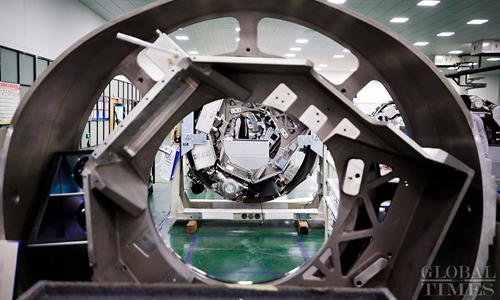HOME >> SOURCE
Coronavirus sparks foreign orders for Chinese CT systems, ventilators
By Xie Jun Source:Global Times Published: 2020/3/28 14:21:22

Photo: GT
As the coronavirus keeps spreading in the world, overseas orders are rising for China-made medical equipment including CT scanners and ventilators, which is expected to help Chinese pharmaceutical businesses to extend overseas market.
A private company in Shaoxing, East China’s Zhejiang Province has received orders from five countries, such as Italy, Germany and France, for their self-developed mobile CT installation “CT Ark” that has been used in the “cabin” makeshift hospitals of Wuhan for diagnosing coronavirus infection.
Italy has ordered about a dozen, said a senior management staff at CT Ark’s maker, MinFound Medical Systems Co. CT Ark is a container-type emergency CT solution, which can be used independently outside of traditional hospitals to prevent cross infection.
More than 30 of the facilities have been used to help make early diagnosis of coronavirus in Wuhan, Central China’s Hubei Province where the killing virus grabbed over 3,000 lives. The 16-slice and 3.5 x-tube CT set a record of scanning 210 people within 6 hours.
As the epidemic is being brought under control in China but spread fast in foreign countries, particularly Europe and the US, orders increased from abroad, bringing rising business to companies like MinFound.
“Overseas markets now account for about 20 percent of our business. It might rise to 30 to 40 percent, as foreign orders surge,” Peter Zhang, MinFound’s vice general manager, told the Global Times.
Zhang said CT Ark is shipped overseas by chartered flights or the China-Europe freight train. Previously, CT Ark had been sold to countries like the US and Egypt.
Li Kai, a director at ventilator maker Beijing Aeonmed Co, said the company has received orders from 35 countries and regions, including Italy and the UK, for their products.
“Now, our employees are working 24/7 to produce thousands of ventilators (to complete the orders),” he told the Global Times, adding that they already exported nearly 1,000 ventilators.
However, as the coronavirus continued to disrupt transportation, Chinese medical companies now face a challenge in sorting components, a large part of which must be acquired from overseas suppliers.
Li, for example, noted that the company might face a shortage of components if overseas production stops. The company relies on the overseas supply of components for making ventilators, including sensors, chips and turbines.
Pan Huasu, MinFound’s chairman, said that the company found it a little hard to source all the components it needs, such as slip rings, as a result of coronavirus disruptions. MinFound has about 300 suppliers scattered around the world.
(Ma Jingjing contributed to the story)
Posted in: INDUSTRIES,COMPANIES,BIZ FOCUS